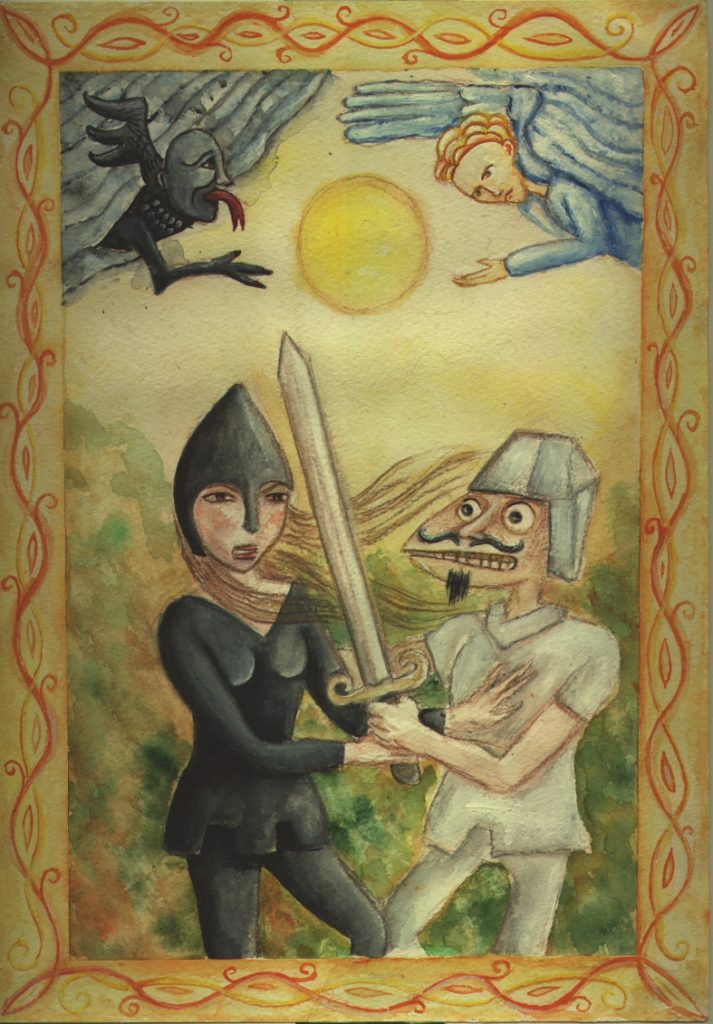I’m on a study project to improve my understanding of roleplaying games. To this end, I already have two reading projects, A Game Per Year and An Adventure Per Year. This is the third, with the goal of reading or playing 52 games made in the last few years. Originally I considered making this “A New RPG Per Week” and that’s where the number 52 comes from, even though a weekly schedule is probably not within my abilities.

Yesterday, I posted about the 2004 game Dogs In the Vineyard. It sparked a couple of interesting discussions about how people played the game. From the people who told me about their own experiences, I got the impression that the play culture around the game was not in complete accordance with the text of the game.
This happens all the time with roleplaying games of course. I’m not from the same roleplaying scene as Dogs In the Vineyard and thus I’m in the outsider position of having access to the text but not really the culture.
Specifically, the text’s descriptions of a patriarchal Faith and its moral rules didn’t seem to feature heavily in the play experiences I heard about. Instead, people judged the situations their characters encountered from a more modern perspective.
That brings us to the game I’m talking about in this post, Pyöreän pöydän ritarit (Knights of the Round Table) by the Finnish designer Sami Koponen. It’s old for this reading project, having been published in 2011, but I decided to read it because it’s interesting in the context of Dogs In the Vineyard.
In Pyöreän pöydän ritarit, the characters are knights from Camelot, serving King Arthur. The game suggests that players make them righteous and good. They travel the countryside, encountering problems and quandaries they’ll attempt to deal with. Ideally, these problems should have a complicated moral dimension so that there’s no easy solution.
The game is meant for beginners and has been designed for the purpose of demonstrating what roleplaying is. It’s pleasantly straightforward and simple. One of my favorite details is when the character’s choose their symbolic animals. The honor stat is determined based on which animal could eat which. It’s a nice playful touch.
Pyöreän pöydän ritarit cites Dogs In the Vineyard as inspiration. In terms of design, it actually resembles the play I heard from people who play Dogs In the Vineyard more than the text of Dogs In the Vineyard does. King Arthur represents values like equality and fairness for gender, religion and social caste. In this way, the players are invited to judge situations essentially using modern liberal values. The game makes no attempt at being historical. Rather, it’s setting of Arthurian legend is an idealized background against which the knights can encounter their quandaries.
Reading Pyöreän pöydän ritarit, I was struck by how few roleplaying games are about playing heroic good guys. Of course, on the surface, many are. In D&D characters are often described as heroes. In practice, however, the actual substance of the gameplay seems to be principally about killing and looting.
In contrast, in Pyöreän pöydän ritarit, the main substance of the game is characters trying to help people with difficult problems. Conflict between characters can arise when their readings of the situation or proposed solutions differ but their basic motivation is the same. In this game, the helpfulness of the characters is not a question of rhetoric but the main substance of what they do in the game.
Dogs In the Vineyard has a similar loop but its complicated by how the Faith the characters belong to is described. It makes its world interesting and unique but also presents the strong possibility that the characters are actually not good people as a modern player might understand the concept.
Pyöreän pöydän ritarit has a few other charming touches as well. It has a campaign option which inevitably leads to the fall of Camelot. After the game’s events have played out, there’s a final part where the players are invited to discuss how the actions of their characters changed the world and what happened to the people they helped.